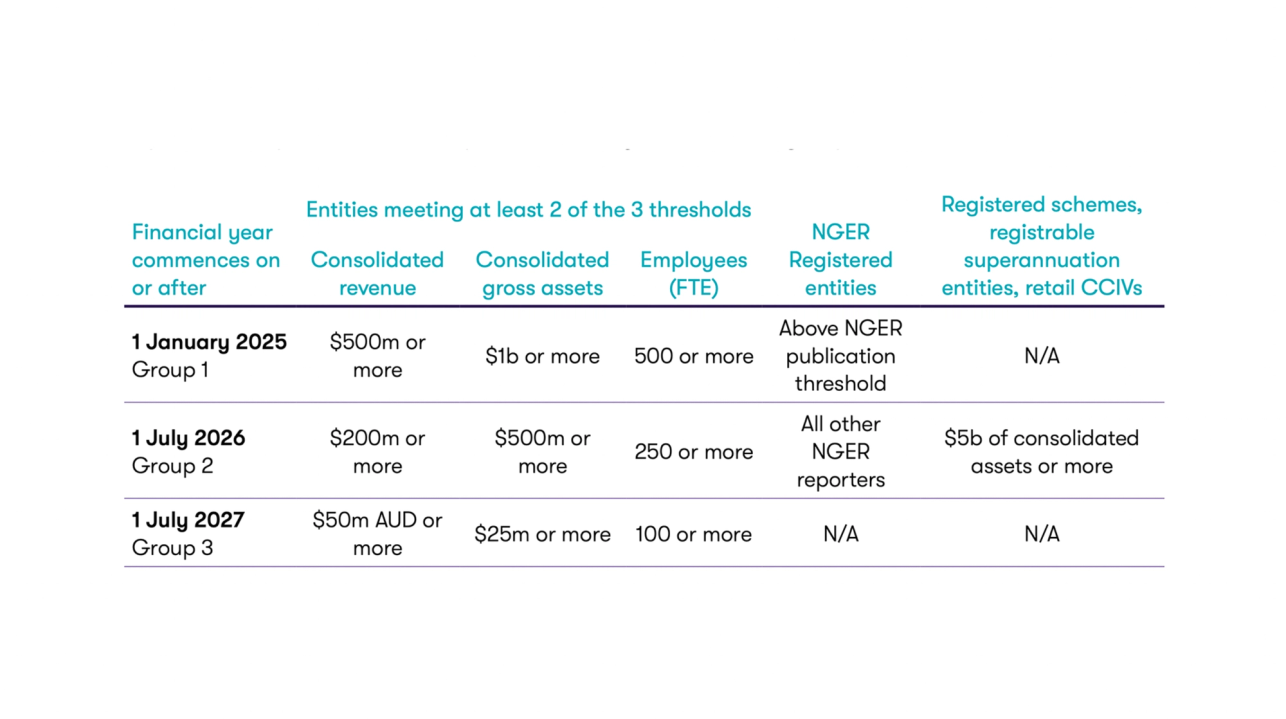Why Australian companies are now reporting embodied carbon
As of Jan 2025, disclosure of 15 categories of scope 3 emissions is required for large companies under the climate disclosures mandate under the Corporations Act (2001).
These Scope 3 embodied emissions categories include purchased products, franchisee emissions and financed emissions. This places a new obligation on developers, franchisors, banks, real estate investors, retail, shopping centres and restaurants to understand their own, their suppliers’, their tenants’ and their customers’ emissions with a limited (rising to reasonable) assurance level aligned to their Annual Reporting cycle.
The climate disclosure requirements align with global standards, initially developed by the Task Force on Climate-related Financial Disclosures (TCFD). These were converted into standards by the International Sustainability Standards Board (ISSB) and translated into Australian requirements by the Auditing and Assurance Standards Board (AuASB)
A phased implementation is planned, with board director accountability and assurance requirements increasing over time (from limited to reasonable) in order to allow companies time to adjust to the regime and to gather data of an appropriate standard from their supply chains.

For more detail on the climate disclosure legislative requirements, see this report by Grant Thornton
This means that companies with a purchasing power of over $900 billion are now looking to their suppliers to help meet their compliance obligations. This in turn means that even companies who fall below regulatory thresholds themselves will shortly be expected to provide annual data to their Tier 1 and 2 customers who are captured by the requirements. Suppliers who are able to provide accurate and timely data may consequently achieve competitive advantage for early action.
Sustainability data standards and assurance expectations, including those related to Scope 3 emissions, are set out in ASSA 5000 (Australian Standard on Sustainability Assurance 5000),
The standard provides a framework for assurance practitioners to offer both limited and reasonable assurance on sustainability information. Under this framework, the level of assurance required—limited or reasonable—directly impacts how thoroughly the data is reviewed.
Acknowledging that companies will take some time to fully capture, manage and understand their Scope 3 emissions reporting under the Corporation Act, claims will be subject to a limited assurance review in the first 3 reports, moving to reasonable assurance thereafter.
Regarding Scope 3 emissions, under a limited assurance regime, auditors are expected to perform a moderate level of review, with less in-depth evidence required than in a reasonable assurance regime. This means that the verification of Scope 3 data could rely on fewer procedures, often focusing on the overall plausibility of the reported information rather than on detailed checks of every data point.
For reasonable assurance, auditors would need to perform more comprehensive procedures and gather a higher volume of evidence to verify the accuracy of Scope 3 emissions data.
Every Rebuilt product carbon footprint (PCF) you submit is independently reviewed by at least one suitably qualified LCA professional before being certified. In addition, the Rebuilt Healthcheck report is provided to every customer. This report evaluates the quality of your provided evidence and its materiality in determining the result of your PCF. This enables product manufacturers to focus on gathering the most important evidence first, and simplifies the job of any corporate auditor who may be required to review results as part of a broader corporate data assurance process.
Rebuilt is committed to working with relevant financial standards agencies to ensure that our ISO 14067 and ISO 14064-3 accredited data gathering, management and verification process and multi-level risk based review of both claims and provided evidence is deemed to satisfy limited assurance requirements.
Find out more about how Rebuilt Verified Product Carbon footprint Reports also help you to comply with Building regulations